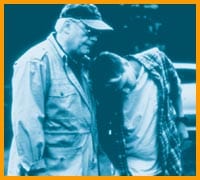Distressing portraits of the decay of American suburbia, from The Stepford Wives to Todd Haynes’ Safe and Todd Solondz’s Happiness, have been a staple of US cinema for decades. There is something morbidly fascinating about seeing a phenomenon that was intended as a modern paradise in all its horrific glory: A place where families fall apart, where nasty secrets hide behind perfectly groomed exteriors and where pursuing the American Dream leads to the abdication of responsibility and the abandonment of morality.
Michael Cuesta’s LIE follows in this tradition. It focusses on a week in the life of 15-year-old Howie (Paul Dano). His mother died recently in a crash on the Long Island Expressway (the highway’s acronym gives the film its title); Howie is far from done grieving her death. With three other kids, Howie has taken to petty crime, breaking into the posh homes that lie just off the expressway.
Howie has a bit of a crush on Gary (Billy Kay), the gang’s flirtatious leader; they become best friends and decide to run away to California together. To finance their trip, Gary and Howie rob the house of an older man known as Big John (Brian Cox). When Big John catches up with Howie, Howie finds out that Gary has been living a secret life – Gary has been sexually involved, for pay, with Big John, an avowed paedophile, for some time.
Big John attempts to seduce Howie and the two enter into an odd friendship – Big John becomes a father figure for Howie, whose connection to his own father is distant at best. But the threat of sexual coercion is always just beneath the surface. When Gary leaves for California without him and his father is hauled off to jail, Howie finds himself searching for the strength to face his future alone.
LIE is a beautiful film to watch – Cuesta is an award-winning commercial director and has developed an acute sense of timing and imagery. And it is peppered with excellent performances. As Howie and Gary, Dano and Kay are a joy. They manage to ingest just the right amount of erotic tension, naiveté and youthful cockiness into their roles to pull off a well-developed camaraderie. As Howie’s father, Bruce Altman runs hot and cold, at a complete loss with raising his kid, dealing with his wife’s death and running a sinking business.
But it is Cox who truly steals the show as the paedophile with a heart of gold. His nuanced portrayal of a man who cares deeply for the boys he gets himself involved with – the banter between him and Howie is something to behold – yet who manipulates and menaces to get them into bed is astonishing: Perverse, poignant and even comic.
LIE is an intelligent extension of an American cinematic tradition, exposing as it does the hideous underbelly of suburban society. But it is also a refreshing update: Rather than looking on helplessly as its addled characters flounder in a social structure they did not create and do not really understand, it gives us a kid who is conscious of what is happening around him, and extends some hope of escape.

 Why you can trust Xtra
Why you can trust Xtra


